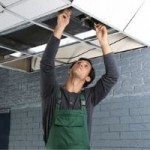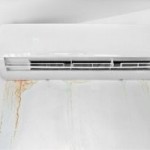What You Need To Know About HVAC System Leaks
It may come as a surprise to learn that HVAC systems can have leaks that could lead to a nightmare situation if not handled promptly. An indoor air conditioning unit should never have water in a pool around it for any reason. This is a sign of a drainage problem, a leak, or inappropriate dripping.
HVAC system leaks can start off as a small problem, but when dealing with water issues in the home, it’s always best to resolve the issue as quickly as possible to lessen the risk of water damage. If the leaking liquid is something other than water, quick attention could also prevent permanent damage to your HVAC system.
Why Your HVAC System May Leak
 There are two types of leaks that can happen to your HVAC system. The first type of leak is refrigerant. HVAC systems are created to have a closed system, where no refrigerant leaks out, however, no system is perfect. Refrigerant leaks as a gas, making it difficult to spot.
There are two types of leaks that can happen to your HVAC system. The first type of leak is refrigerant. HVAC systems are created to have a closed system, where no refrigerant leaks out, however, no system is perfect. Refrigerant leaks as a gas, making it difficult to spot.Since refrigerant contains oil to grease the compressor, you may notice an oily spot next to the HVAC unit if a leak is present. A large oil leak, can mean you have a faulty compressor. You may also notice a higher-than-average electric bill if a slow leak is present. As the refrigerant leaks out, the compressor works overtime, using more electricity.
Your system will also run whether the refrigerant is present or not, and if it’s not, then your system may struggle to keep a constant temperature. Keep an eye out for this HVAC refrigerant leak symptom as well.
The second type of leak is a water leak. You may notice a pool of water around your indoor HVAC unit, which should never happen. You also should never see ice anywhere on the unit. Your HVAC system has two components that sweat, the evaporator coil and the suction line. The suction line is covered in insulation, which is meant to stop condensation from dripping in your home.
If there is a tear in that insulation, a drip will occur. The water from these two parts is supposed to run down a coil into a drain or pipe that transports the water out of your home. If the coil is dirty or the drain or pipe is clogged, then water can pool around your HVAC unit.
How Technicians Are Fixing HVAC Leaks
How your technician fixes your HVAC leak, depends on where the leak is coming from. A tear in the insulation on your suction line may be an easy patch fix. If you have a dirty coil, water won’t be able to go down the drain until it’s cleaned.
If you have a clogged drain, a technician can use a wet/dry vacuum to remove any blockages. Part of the drainage system involves a pan that can corrode over time. A qualified technician will check for any cracks or holes in the pan to see if it needs to be replaced.

Another common problem is when your indoor HVAC unit’s coil becomes icy. This most often happens when there is a refrigerant leak or when a dirty air filter is causing a ventilation problem. A professional can check your system for refrigerant leaks and check if air filters need to be replaced to give the compressor a break from working overtime.
Tips For Preventing HVAC Leaks In Your Home
 If your HVAC system is leak-free, there are some leak prevention tips you can follow to avoid any problems in the future. First, make sure to keep an eye on if your system is struggling to keep a constant temperature or if your electric bill is unusually high.
If your HVAC system is leak-free, there are some leak prevention tips you can follow to avoid any problems in the future. First, make sure to keep an eye on if your system is struggling to keep a constant temperature or if your electric bill is unusually high.These are both signs of a refrigerant leak. Next, you’ll want to make sure to change your air filters regularly. This means every other month during the winter months and every month during the summer.
Fresh air filters will cut back on the risk of ventilation problems that could cause your compressor to go into overdrive. Lastly, an annual HVAC system maintenance visit by a licensed professional will keep your leak risks low while also ensuring it works as efficiently as possible.
Trust Barker Heating & Cooling
Serving the Livermore area since 1998, family-owned Barker Heating & Cooling is your companion for a healthy home. Trustworthy and friendly technicians arrive on time, when it’s convenient for you, and provide honest recommendations with your best interest and budget in mind.













